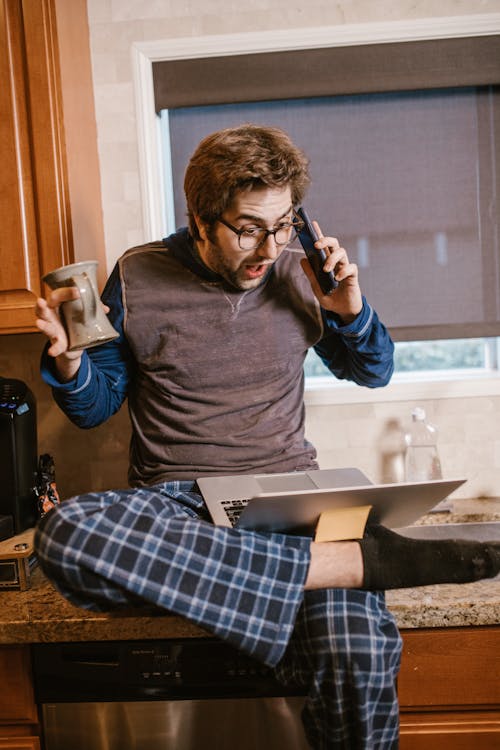My day started out as it always did: coffee, email, X, and a quick Facebook scan…then I see it.
Staring at me, even before my coffee got cold, was post after post, and photo after photo, of a sick, bloodied, and crying child. The poor child in a blood-soaked bandage showing an actual lump removed from his head! I could have gone the rest of my life not seeing that and I would have been fine. It is an image that I. Will. Never. Unsee–and believe me I want to.
While that post gained a bit of sympathy from me, it made me want to run to the nearest privy and heave my breakfast into the first available open catch I could find. What in the world was this parent thinking? Is her kidlets’ dignity less important than the amount of comments and “likes” she might score as a viral meme? I can’t even imagine going through something like that let alone make it that incredibly public.
Parents love to share children’s problems and challenges. This sharing of unhappy days gains followers and support.
But what about happy things our children do? Does that get the same amount of likes? Just like the news on TV, mostly the really crazy and unbelievable stuff is aired. Few happy stories are shared because that doesn’t gain viewers.
Nevertheless, we parents are perfect braggarts when our kids are involved; I’m sure I’m guilty of that. Isn’t that what Instagram and Facebook are for–to share pictures of our kids? We are proud of our kids, and let’s face it, social media is a great way to keep in touch with family and friends.
But at what point does sharing become too much?
Sin Number 1 – Anything is Fair Game
Grandmas, Nannies, Nana’s and all the “Pop-Pop’s” take note–in a few years, your grand-babies are not going to be babies anymore. They will be adolescents, then dare I say–teenagers. Your Facebook friend, whom you’ve shared that photo of your messy pudding-faced angel while wearing only a diaper, will most likely ‘have a friend, that knows someone, who knows another kid, and just happens to be in your grand-kids’ class at school.’ Bullying is real. Families should also understand that there are plenty of pedophiles searching the web looking to steal “pudding faced diaper photos” and it won’t matter how much online security you have in place. Please be selective when posting those precious cherub moments.
Sin Number 2 – Kids Are People Too
When parent’s display their kids problems on social media, they essentially are overriding their kids’ rights. Children of all ages should have a reasonable expectation that their parents will protect their privacy. Parents would do well to stop and think about how much sharing is really necessary. Posting every milestone your child manages, two or three times per day, every single day is, well,–boring! Kind of like the guests that won’t leave. “I am glad you visited but now go home. See you in a week or so.” I would not like every embarrassing challenge or problem I have put out for the world to see. Ask yourself, “If the tables were turned, would I mind that my kidlet showed a picture of me in my underwear eating dessert”? Seriously, think about it.
Sin Number 3 – Munchausen by Facebook
Parents who share their kidlet experiencing every little sniffle, procedure, or fever, for the sake of “likes” reminds me of the disease “Munchausen by Proxy” where parents intentionally hurt the child to gain sympathy. While I am not suggesting that some parents who overshare their kids’ health conditions have this mental disease, I do believe that much of this behavior is motivated by the idea that “going viral” is a real possibility. “Yeah, my kid is really sick, I’ll get through it; thank you for your concern” kind of thing. I’ve never seen so many jovial parents jump at the chance to snap a quick selfie with their sick kid; real cringe to say the least. All our kids get sick, but it is not the time to take photos in their most vulnerable moments. I recommend you put the phone down and take care of your child.
Sin Number 4 – Devil in the Details
Posting a photo of your sick kid with tubes hanging out of his arm or nose is a “no-go” for me. People are concerned, and I think I speak for plenty of people, we don’t want to see the details; nor should we. No one wants to see tubes, ghastly bandages, and throw-up buckets on the side of the bed. Parents who need to communicate that their child might not be attending school that day, or is having a procedure, might want to send a text or a private message directly to the intended recipients; anything else is “click-bait.”
Sin Number 5 – HIPAA Laws
The Health Insurance Portability and Accountability Act of 1996 (HIPAA), basically gives us rights over our medical data and sets limits on who can view our health information. Parents sign these forms at every doctor or hospital visit. These documents explain the rules of each participants’ role. The irony here is that families will then complain to the first receptionist or nurse that might accidentally have left the kids folder out in the open for all to see. Why then, is it acceptable for parents to post pictures or speak in a public forum and disclose every last detail about their child’s illness? Children have rights; this is private health information. Even though they might be too young to advocate for themselves, children are still due the same medical discretion. Once the child turns 18, there might be additional risk of public humiliation, loss of job prospects; even lifelong relationships could be affected.
The long-term effects of how social media will affect our children is not really known because it is an ongoing practice. It’s an ugly truth that social media can quickly turn friends into enemies based on simple page interactions. Unfortunately, we won’t know how the use of child-oversharing on social media will affect the children—until—it affects the children.
Photo credit – RDNE Stock Project




Let’s Talk!